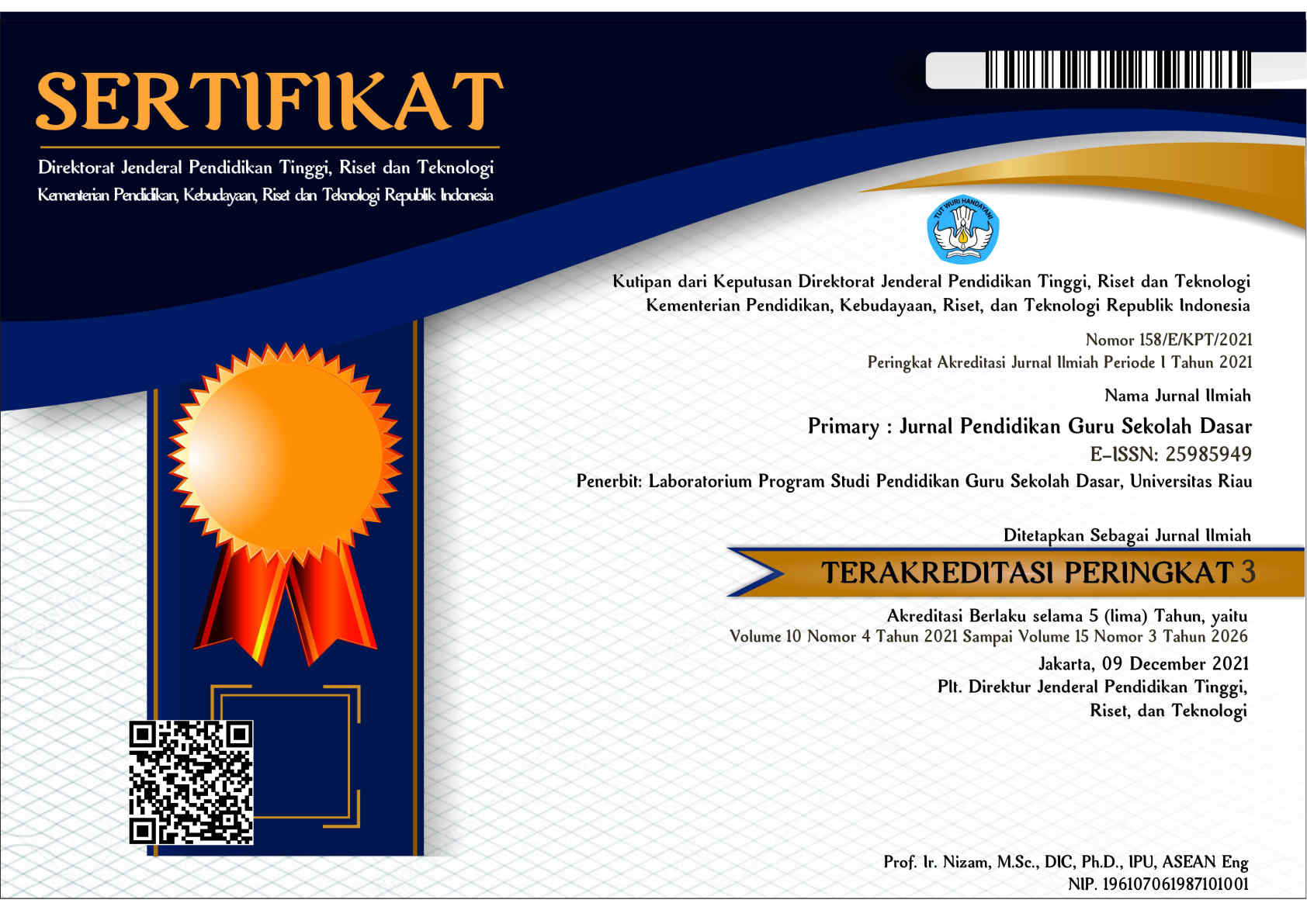IMPLEMENTASINYA PERKULIAHAN MATEMATIKA YANG HUMANISTIK PADA MAHASISWA KELAS 3T (TERDEPAN, TERPENCIL DAN TERTINGGAL)
Abstract
This research is a qualitative descriptive study that reveals the implementation of humanistic mathematics lectures to the students from the Frontier (Terdepan), Remote (Terpencil) and Backward (Tertinggal) Areas (3T). The data were analyzed with qualitative data analysis techniques. This study aims to describe a model of humanistic mathematics lecture, explain the humanistic mathematics lectures, and explain the role of lecturers in humanistic mathematics lectures. The research subjects were students from the 3T area. 3T students are students from the most outermost regions in the territory of Indonesia. Mappi, Manokwari-Sorong, Timika, Asmat, and Mentawari Regencies. The results of the study stated that the humanistic mathematics learning model was using the PMRI approach. Steps of humanistic mathematics lectures: (1) introduction of the lectures, (2) understanding the material in groups, (3) groups interaction, (4) sharing opinions, (5) using the context in accordance with 3T students, (6) the freedom in searching for information, (7) students construct their own knowledge, (8) creating SANI : polite (santun), open (terbuka) and communicative (komunikatif) in lecturing, and (9) students were facilitated by positive, cooperative and open activities. The role of lecturers in humanistic mathematics lectures was as a facilitator and mediator.
Keywords
Full Text:
PDF (Bahasa Indonesia)References
Anggraini, M. S. A., Ismaniati, C., & Mustadi, A. (2019). Peningkatan Pemahaman Konsep Dasar Ips Mahasiswa Pgsd Melalui Model Cooperative Tipe GI. Didaktika Tauhidi: Jurnal Pendidikan Guru Sekolah Dasar, 6(1), 42-57.
Hendriana, H. (2014). Membangun Kepercayaan Diri Siswa melalui Pembelajaran Matematika Humanis. Jurnal Pengajaran MIPA, 19(1), 52-60.
Marpaung, Y., & Julie, H. (2011). PMRI dan PISA: Suatu usaha peningkatan mutu pendidikan matematika di Indonesia. Widya Dharma.Riyanton, M. (2015). Pendidikan Humanisme Dan Implementasinya Dalam Pembelajaran Bahasa Indonesia. Jurnal Ilmiah Lingua Idea, 6(1).
Ningsih, R. P., Syahrilfuddin, S., & Lazim, L. Penerapan Teori Jerome Bruner untuk Meningkatkan Hasil Belajar Matematika Siswa Kelas IV B SD Negeri 158 Pekanbaru. Primary: Jurnal Pendidikan Guru Sekolah Dasar, 9(1).
Prabowo, A., & Sidi, P. (2010, November). Memahat Karakter Melalui Pembelajaran Matematika. In Dadang Sunendar et al. Teacher Education in Developing National Characters and Cultures. Proceedings The 4th International Conference on Teacher Education, Jointly Organized by Universitas Pendidikan Indonesia (UPI) Indonesia and Universiti Pendidikan Sultan Idris (UPSI) Malaysia.
Sofyan, N. S. (2020). Pengembangan Model Pembelajaran Kooperatif Berbasis Akhlak Dalam Penerapan Kurikulum 2013 Di SDN Kota Dumai. Primary: Jurnal Pendidikan Guru Sekolah Dasar, 9(1).
Sukmadinata, N. S. (2009). Metode Penelitian Pendidikan. Bandung: PT. Remaja Rosda Karya.
Syifaâ, R. (2008). Psikologi Humanistik dan Aplikasinya dalam Pendidikan. EL TARBAWI, 1(1), 99-114.
Ta'rifin, A. (2009). Membangun Interaksi Humanistik dalam Proses Pembelajaran. In Forum Tarbiyah, 7 (1), 99-114. Fakultas Tarbiyah IAIN Pekalongan.
UU No. 20/2003 tentang Sistem Pendidikan Nasional Bab II Pasal 3 yang diunduh tanggal 23 Maret 2020 https://kelembagaan.ristekdikti.go.id/wcontent/uploads/2016/08/UU_no_20_th_2003.pdf
Wahyudin, Y. (2009). Teori Belajar Humanistik Carl Ransom Rogers dan Implikasinya terhadap Metode Pembelajaran Pendidikan Agama Islam.
DOI: http://dx.doi.org/10.33578/jpfkip.v9i3.7892
Refbacks
- There are currently no refbacks.
Copyright (c) 2020 Andri Anugrahana

This work is licensed under a Creative Commons Attribution-NonCommercial-ShareAlike 4.0 International License.
____________________________________________________________
Primary: Jurnal Pendidikan Guru Sekolah Dasar
Secretariat
Program Studi Pendidikan Guru Sekolah Dasar
Gedung B1, FKIP Universitas Riau
Kampus Bina Widya Km. 12,5 Simpang Baru Panam
Pekanbaru Riau Indonesia 28293
e-mail : primary@ejournal.unri.ac.id



